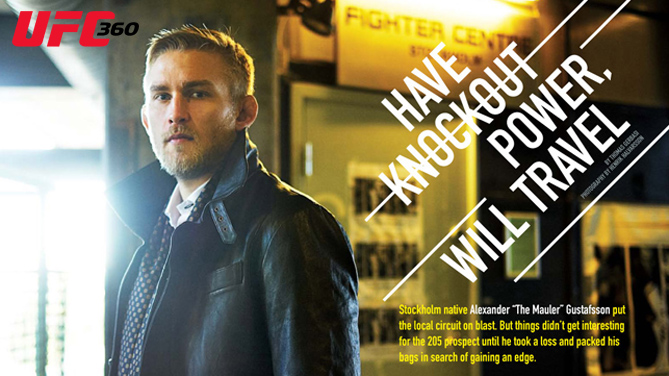 The eighth professional fight of Alexander Gustafsson’s mixed martial arts career on May 30, 2009, went pretty much like the previous seven. Fighting Ukrainian journeyman Vladimir Shemarov in his hometown of Stockholm, Sweden, the six-foot, five light heavyweight prospect looked like he was competing against a small child, and the result was inevitable from the time the bell rang until the referee intervened a little over two and half minutes later.
The eighth professional fight of Alexander Gustafsson’s mixed martial arts career on May 30, 2009, went pretty much like the previous seven. Fighting Ukrainian journeyman Vladimir Shemarov in his hometown of Stockholm, Sweden, the six-foot, five light heavyweight prospect looked like he was competing against a small child, and the result was inevitable from the time the bell rang until the referee intervened a little over two and half minutes later.
Gustafsson’s next step would be the UFC, but he wondered whether graduating from the Shemarovs of the world to the elite fighters in the game would be too big of a leap so soon. “I didn’t really know what to expect,” said Gustafsson. “I just knew the big stars were fighting for the UFC.” He pauses. “And then I had my first fight and I knocked the guy out in 41 seconds and I was like, ‘Whoa, this is easy. I’m just gonna do this now.’”
The Big Show
Gustafsson, 25, laughs when thinking back to his 22-year-old self and how he thought a blistering first-round knockout of Jared Hamman at UFC 105 in November of 2009 was going to be par for the course in the Octagon. He found out otherwise five months later when he met fellow unbeaten Phil Davis.
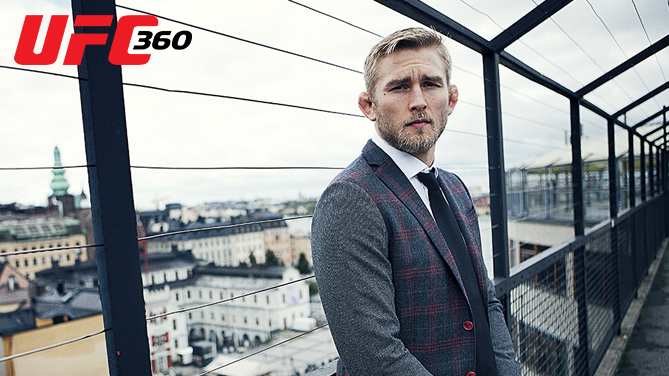 “He took me down and made me realize what it is to be a professional fighter, and how it is to live as a fighter, and that you have to be constantly learning,” said Gustafsson, who was submitted by Davis with five seconds left in the first round. He hasn’t lost in six fights since, including a December 8 showdown with former light heavyweight champion Mauricio “Shogun” Rua, “The Mauler” is seen by many as the one fighter with the size, skill set, and athleticism to truly challenge current 205-pound boss Jon Jones. Not that he allows himself the luxury of looking too far ahead. He’s already done that once before.
“He took me down and made me realize what it is to be a professional fighter, and how it is to live as a fighter, and that you have to be constantly learning,” said Gustafsson, who was submitted by Davis with five seconds left in the first round. He hasn’t lost in six fights since, including a December 8 showdown with former light heavyweight champion Mauricio “Shogun” Rua, “The Mauler” is seen by many as the one fighter with the size, skill set, and athleticism to truly challenge current 205-pound boss Jon Jones. Not that he allows himself the luxury of looking too far ahead. He’s already done that once before.
“I always have an eye on the champ—that’s my main goal, to fight for the title and bring home the belt,” he said. “That’s what every fighter wants. But I never look past an opponent.”
An Unlikely Friendship
Funny what one loss can do, but it wasn’t just the lone blemish on his 14-1 record that kicked Gustafsson’s career into gear, but a post-fight talk with the man who was responsible for it.
“I was super pissed off, and Davis was super happy. I don’t even remember what I said,” laughed Gustafsson. “But he invited me to Alliance [Davis’ gym in San Diego] to train, and I talked to Andreas Michael, my head coach, and he talked to Eric Del Fierro, the head coach of Alliance, and everything felt good, so we said, ‘Why not? Let’s go overseas and train and see how it is,” and we did it.”
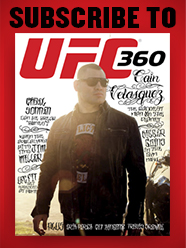 Many times, MMA will surprise you. This was one of them, as a former national wrestling champion from the United States formed an instant bond with a Swedish striker, inviting him to be a part of his training team across the world after they just traded blows in the Octagon.
Many times, MMA will surprise you. This was one of them, as a former national wrestling champion from the United States formed an instant bond with a Swedish striker, inviting him to be a part of his training team across the world after they just traded blows in the Octagon.
“We have so much in common,” said Davis when asked about how the pair went from opponents to training partners. “We’re young guys and we were getting into MMA, we both didn’t have a whole bunch of fights, and you know when you just meet someone and have an instant parallel with them, and that’s basically what it was.”
Happy Accidents
It’s just one of many happy accidents that led to Gustafsson’s current standing as one of the UFC’s top light heavyweights. Born in Arboga, a town with a population of just over 10,000 people, Gustafsson found his way to a boxing gym at the age of 12, but not because he had dreams of becoming the next Ingemar Johansson. “I just trained boxing because my friends did it and I thought it was a cool thing to do,” he recalled. “I was a young kid. I trained for a while and then I stopped for a year. I didn’t know what to do, so I moved to another city with a friend and I was just hanging out. I was scuba diving a lot on the west coast of Sweden. I did that until I was a dive master, and I was having fun and just did everything.”
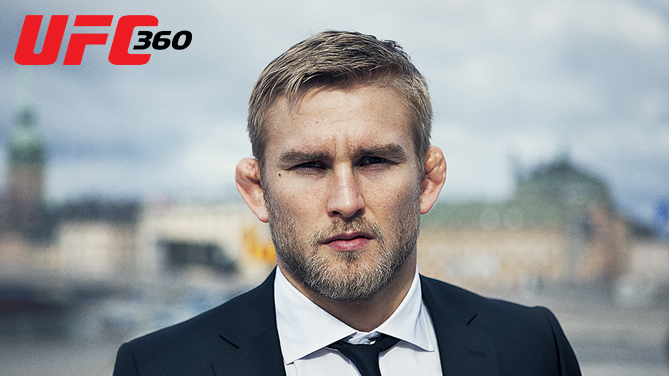 Everything eventually included a trip to a local mixed martial arts gym. Game over. “I trained the first session, and after that I started looking at all these YouTube clips of old PRIDE fights with Cro Cop, Wanderlei Silva, and all these guys, and I got hooked. Since then I’ve been doing it.”
Everything eventually included a trip to a local mixed martial arts gym. Game over. “I trained the first session, and after that I started looking at all these YouTube clips of old PRIDE fights with Cro Cop, Wanderlei Silva, and all these guys, and I got hooked. Since then I’ve been doing it.”
With his size, athletic gifts, and raw talent, Gustafsson obviously had a high upside in his new sport. Andreas Michael, a former coach for the Swedish boxing team, saw it immediately. “Alex was a tremendous athlete and talent,” said Michael. “I’ve gone to the World games, the European games, and I’ve got medals in those as well, so I’m used to training very good athletes at a high level, and I can tell you that Alex is one of the hardest working and best athletes that I’ve ever trained.”
Tearing through the European circuit after turning pro in November of 2007, Gustafsson loved the sport, but it wasn’t until the wins started piling up that he thought it could become something bigger. “I just took one fight at a time, and I did it on the side as a hobby. Then I was 5-0, 6-0, and I realized I could do something and make a career out of it, and I decided to go all in.”
Studying Abroad
Yet even though he remained unbeaten and earned a UFC contract and a UFC win, it wasn’t until the Davis fight that he began to realize what it took to be a champion as opposed to just a good fighter. “When I lost to Phil I realized that I had to go to the States to get better sparring and more bodies to train with,” said Gustafsson, who wasn’t getting the UFC-level sparring he needed in Sweden. And with a top-notch camp in San Diego’s Alliance MMA willing to bring him in, he didn’t need to be asked twice. It ended up being the perfect fit, because with Alliance head coach Eric Del Fierro having spent plenty of time planning to beat Gustafsson, no one knew what needed to be worked on better.
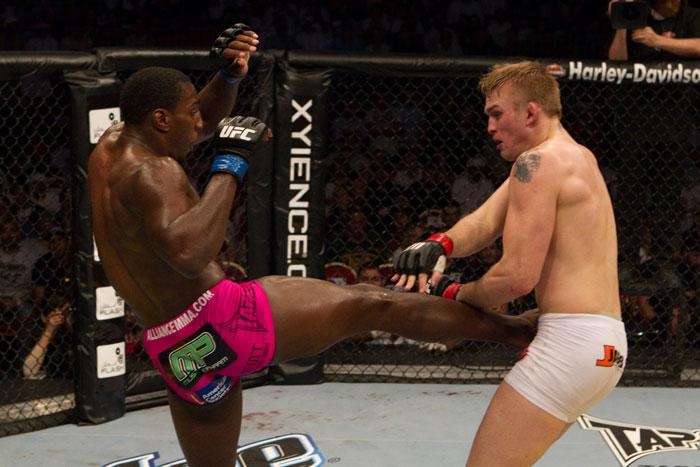 “We had a specific game plan for that fight going in against Alex, and it worked out for us, so we knew what his weaknesses were gonna be when he came to us and looked to help us out,” said Del Fierro. “So the little added insight into facing him as an opponent helped us see what he had. The kid has a lot of heart. Even in losing, he was in the fight and he probably did better at defending Phil Davis’ takedowns than a lot of people have.”
“We had a specific game plan for that fight going in against Alex, and it worked out for us, so we knew what his weaknesses were gonna be when he came to us and looked to help us out,” said Del Fierro. “So the little added insight into facing him as an opponent helped us see what he had. The kid has a lot of heart. Even in losing, he was in the fight and he probably did better at defending Phil Davis’ takedowns than a lot of people have.”
Count “Mr. Wonderful” among the impressed as well. “He’s crazy dangerous,” said Davis. “All the fights I had seen of him outside the UFC, those fights were super short and he was destroying people. He had a natural poise and you could just tell. He’s a good striker, he knows what he’s doing, and that was a lot of the danger going in. I definitely wanted to wrestle with this guy because he was very relaxed.”
So with an October 2010 bout against French striker Cyrille Diabate scheduled, Gustafsson and Michael took the flight to Southern California and went to work. When asked if he helped his former opponent with the adjustment to life in the United States, Davis laughed, “He didn’t need no adjustments. He came over and he was having a ball.”
He was also picking up the little details that make a big difference on fight night. At UFC 120, he submitted Diabate via rear naked choke in the second round, getting back to his winning ways. But in 2011, the Gustafsson hype train took off, as he submitted James Te Huna in February, stopped Matt Hamill in two rounds in August, and finished off the year in December with a first round knockout of Vladimir Matyushenko.
The Main Event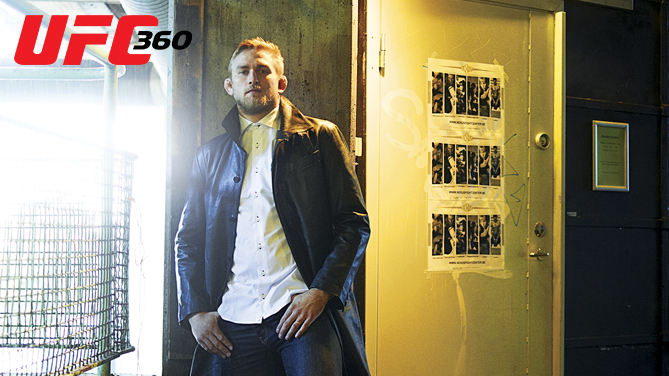 Three fights, three finishes, and with the UFC ready to announce its first trip to Sweden for an April 2012 event on FUEL TV, the fighter in the headline spot was a no-brainer. At this point in practically any other fighter’s story, it’s time to talk about the distractions, the bumps in the road, the loss of focus or the cracking under pressure—not for Gustafsson. He admits that he had a tough camp leading up to his headlining bout in Stockholm against Thiago Silva and that there was a lot of pressure, but in the end, he showed up to the Ericsson Globe Arena, scored a near-shutout win over a dangerous opponent, and notched his fifth straight win. It was business as usual.
Three fights, three finishes, and with the UFC ready to announce its first trip to Sweden for an April 2012 event on FUEL TV, the fighter in the headline spot was a no-brainer. At this point in practically any other fighter’s story, it’s time to talk about the distractions, the bumps in the road, the loss of focus or the cracking under pressure—not for Gustafsson. He admits that he had a tough camp leading up to his headlining bout in Stockholm against Thiago Silva and that there was a lot of pressure, but in the end, he showed up to the Ericsson Globe Arena, scored a near-shutout win over a dangerous opponent, and notched his fifth straight win. It was business as usual.
“It was mixed feelings,” he said of his first UFC main event. “It was both really awesome and then really tough. I had a tough camp in Vegas with all the guys, and tough sparring, and I felt a little pressure because it was on home ground, but I had my head coach, Andreas, and he mentally coached me too, and we were talking, so at the end I felt good and I was ready. It was the best thing that happened to me.”
If he wasn’t Swedish, you could call him the All-American boy. He shows up to work, does his job, and then it’s back into the gym until the next time. No controversy, no trash talking, nothing that will distract him from his goal of becoming champion.
“That’s something we all need to think about as high-level competing athletes,” he said. “We need to behave and be role models for the younger kids and the younger talents that are on the way up. We all have that responsibility.”
When asked how does he keep it all together, Gustafsson just chuckles.
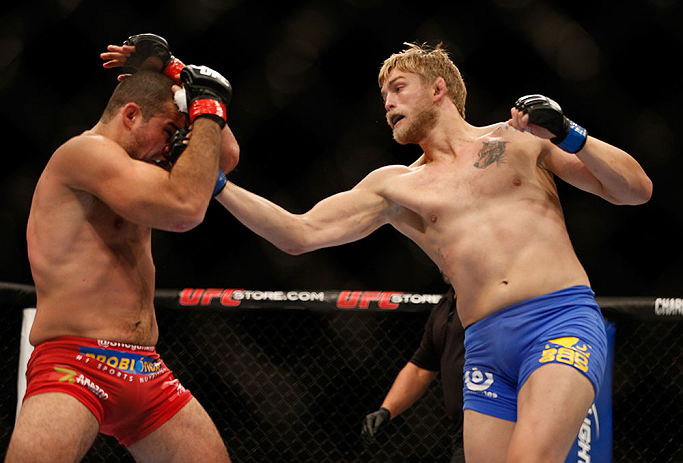 “It’s just the way I am as a person. Of course I’m hanging out with friends and I have fun and stuff, I’m just a human being. I try to do my thing and try to do everything the right way, but we all make mistakes sometimes. I’m learning too, and it’s always a process when you’re learning.”
“It’s just the way I am as a person. Of course I’m hanging out with friends and I have fun and stuff, I’m just a human being. I try to do my thing and try to do everything the right way, but we all make mistakes sometimes. I’m learning too, and it’s always a process when you’re learning.”
Good Man Mauler
“He’s the same person I knew seven years ago,” said Michael. “Nothing has changed and nothing has gone to his head. He likes the simple things, and he likes to live his life the way that he lived before. We go fishing together, we’re going to start hunting together, and we’re best friends as well. He’s very humble and a pleasant person to be around.”
And the type of person you wouldn’t want to meet in the Octagon. At least that’s the consensus heading into December’s battle with Rua. Following grueling brawls with Dan Henderson and Brandon Vera, the Brazilian bomber’s excitement meter is at an all-time high, but the wear and tear he’s probably experienced in the process could make him ripe to be the victim of a career-defining performance by Gustafsson. Of course, no one on his team is approaching the fight with that thought in mind. In fact, ask the Swede for his first impression of Rua, he deadpans, “I was scared as hell. He’s a mean one and a tough guy.”
You could say the same thing about Alexander Gustafsson, at least the one who shows up when the bell rings. But as Davis points out, those aren’t the most telling parts of his personality. “Alex cannot stand losing,” he said. “He is a poor sport [laughs]. He does not tolerate losing and he does not like it. That’s not Alex’s game. He does not know anything about losing.”
And that’s what makes him a winner.